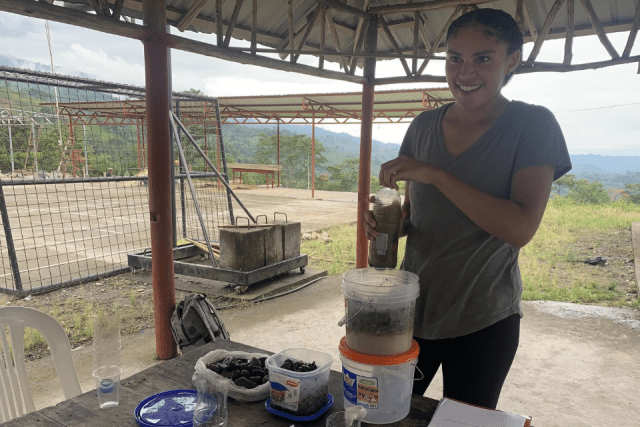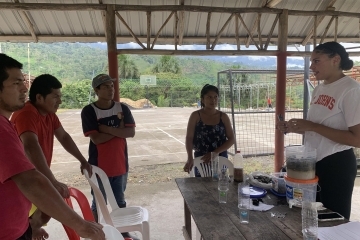
St. John’s Ozanam Scholars Program is a highly selective, academic initiative that combines service, research, and global learning. Through the program, scholars examine and seek solutions to real-world social justice issues, travel around the world to serve those in need, and complete a capstone project during their senior year. In this series, we look at Ozanam Scholars from the Class of 2020 and the impact each has made on society.
Zoe Sheppard
Even before she explored St. John’s Queens, NY, campus, Zoe Sheppard knew she wanted to focus on service as a college student. Fortunately, the native of Laurel, MD, learned about the Ozanam Scholars program during a St. John’s campus tour when she was still in high school.
“My tour guide was an Ozanam Scholar, and I was amazed to hear about all of the service work and travel that he had done through the program,” recalled Zoe, who had engaged in service work throughout her time in high school. “It was important for me to be at a diverse campus with plenty of social justice work opportunities. The Ozanam Scholars program seemed perfect as it involved social justice work on and off campus.”
An Environmental Science major with minors in Social Justice and International Studies, Zoe was involved in service opportunities through the Ozanam Scholars program. Locally, she volunteered as a tutor at various elementary schools and participated in after-school tutoring programs for homeless children, as well.
“I also volunteered at Project Identity, which is a nonprofit organization that helps people secure different forms of identification such as New York State IDs, marriage certificates, and more,” she said, explaining that homeless shelters and soup kitchens in New York often require people to have some sort of identification to receive service.
Zoe also volunteered at various sites during Ozanam Scholar service trips to Ecuador, Ghana, Italy, and Puerto Rico. In Ecuador, she found inspiration for her capstone project, “Water Contamination and Practical Treatment Methods in Indigenous Ecuadorian Shuar Communities.”
“From the beginning of my college career, I had always been interested in the land and water rights of Indigenous people,” she explained. “I knew that the trip to Ecuador would be an excellent opportunity to investigate the issue of water contamination amongst those communities.”

She explained that children throughout the community contract diarrheal diseases due to the contaminated water in their region. Her research ultimately led to the implementation of a local workshop where parents learned how to construct their own homemade slow sand water filters with materials that were readily accessible to them.
While Zoe’s work made an indelible impact on a developing community, she is quick to thank those who helped her throughout the process. “My mentor, Pablo J. Sanchez, an adjunct instructor, was a tremendous help to me,” she said. “He has traveled to Ecuador with the Ozanam program for eight years, and the community members know him well. His connection with them, along with his encouragement throughout the entire research process, was instrumental.”
With an eye on the future, Zoe is studying for the LSAT exam and plans to attend law school next fall. “I am interested in pursuing public service law,” she said. “My ultimate goal is to continue to be involved in social justice work. It is what I want to do for the rest of my career.”
Related News
St. Thomas More Church at St. John’s Featured on “NYC Catholic Church Tours”
Adam Llorens is an emerging Catholic social‑media content creator and storyteller whose passion for sacred spaces, faith, and community informs and inspires a growing online audience. Mr. Llorens, a...
Vincent’s Table Brings Dignity and Support to Students Facing Food Insecurity
Food insecurity among US college students is a rising problem. About 3.8 million college students experienced food insecurity in 2020 and it has only grown steadily worse.
Leading with Heart: Lucy A. Pesce Recognized for Changing Lives at St. John’s
Commitment to the Vincentian mission shone brightly last week when Lucy A. Pesce, Executive Director for Mission Initiatives at St. John’s University, was honored by Depaul USA with the Dax Champion Award for her unwavering leadership and compassion. Ms. Pesce’s recognition highlights not only her personal dedication but also the University’s broader mission to uplift and serve individuals experiencing homelessness.
